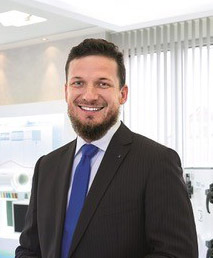… as also to sound levels is critical in selecting the right type of grilles and diffusers. What are the consequences of paying less attention to them, with price being the main area of focus?
Grilles and diffusers are essential elements that determine the level of comfort in the built-environment, in terms of air velocities and sound levels. But what happens when a client’s preference with regard to price and aesthetics, though an important factor, takes precedence over quality?

Balagopal Nair
Balagopal Nair, Engineering and Business Development Manager, Faisal Jassim Group, says: “Aesthetics plays a crucial role while selecting grilles and diffusers; however, performance and quality must be given priority. The performance of a cooling system depends on the comfort it provides within the space it serves. Factors like the dry bulb temperature (DBT), humidity, mean radiant temperature and air movement are influencers that determine the comfort level in a room and must be taken into consideration.” Matthias Kasprowicz, Regional Managing Director, TROX Middle East, echoes Nair, when he speaks of the manner in which products typically are selected. “I have experienced product selections, which have gone against the engineering theorem,” he says. “And what is a good engineering theorem? Well, as educated professional engineers, we have a responsibility to come up with a good working solution. And after studying the various parameters with regard to noise, pressure levels, temperature and velocity, it is our duty to come up with a workable solution.” There are many, who instead of taking the parameters into consideration, settle for products that are cheap and not premium in quality, he says. As a result, sound levels are not within the permitted range, and air velocities and drafts make living uncomfortable.

Matthias Kasprowicz
Kasprowicz acknowledges the fact that the grilles and diffusers market is a cost-driven one, where quality is only appreciated in areas where prestige comes into play. He says: “Unfortunately, the demand for high-quality products has always been limited to 10-15% among all buildings in the Middle East region. He highlights how at select five-star hotels, guests complain about the HVAC systems, a place where customer comfort should be treated with utmost importance. He says, “This example is proof, how in some places, profit is given priority over quality, which is not an ideal long-term method of functioning.”
According to Tecnalco Aluminium Technical Engineering Factory, the market size of the grilles and diffusers sub-industry is estimated at USD 25 million in the GCC region, and USD 15 million in Saudi Arabia. However, the sub-industry faces a number of challenges, when it comes to product supply. The geopolitical situation in the Middle East is a matter of deep concern, and is putting a considerable amount of strain on manufacturers, suppliers and contractors – in some cases even causing companies to shut down operations.
Kasprowicz believes the situation has led to an increase in instances of value engineering, as is defined in the region. He says: “Due to the current economic situation, we see a trend, where the concept of value engineering is misused. Instead of applying a good value with a good solution, today it’s all about buying products that are cheap, even though a project might have no financial pressure.”
Yet another challenge is the reduction in product uptake. Tecnalco, for instance, recorded fewer orders between the last and this month, as a result of which the company is booking orders against L/C conditions with 90 days against delivery.
Nair, however, is optimistic about the situation and feels positive about dealing with the present economic slowdown. He says: “There are a number of regulatory standards, like the Estidama programme, a distinctive framework developed by the Department of Urban Planning and Municipalities (DPM) for measuring sustainability and performance beyond the usual planning and construction phases. Following these standards, for instance, will ensure that Volatile Organic Compound (VOC) levels of powder coating in grilles and diffusers are within the approved limit.” Nair makes the point to say that in the end, the quality of the products offered will play a role in brand selection.
“Education is key,” asserts Matthias Kasprowicz. Interestingly, despite the economic situation, his company has been increasing its business footprint in the market, he claims. “As a manufacturer, we have a responsibility in the market to educate every stakeholder,” he says. “Be it contractors, developers, clients or consultants, it’s all about coming up with a well-engineered HVAC solution.” He speaks of how TROX conducts regular seminars for consultants and engineers, and of how the company has been introducing several products that have been successful across markets in the past few years. TROX, he points out, has delivered on a number of projects with respect to grilles and diffusers, including to the Dubai Mall, the Louvre (Abu Dhabi), Etihad Museum and the Dubai Opera.
Nair explains how the grilles and diffusers market is undoubtedly price-sensitive and asserts that price margins have been affected. But despite the economic slowdown, he says, the Faisal Jassim Group does not believe in compromising on quality. He says: “We are always in the process of opening up new export markets in order to leverage our profit margins and maintain quality. A number of low-cost options for grilles and diffusers exist in the market, but these products cannot be called as options, if they are compromised on quality while being manufactured.” He points out that the cost of aluminium per tonne is decided globally and, hence, the difference in cost among manufacturers is the cost of production, which results in a commendable difference in selling price. If a brand sells below the average market price, he says by way of citing an example, it means that the thickness of aluminium used might have been compromised upon.
Even as there are regulatory standards, which help contain the situation, few companies continue to see a spurt in growth. Nair estimates a 15% rise in business volume in comparison to the past one year and attributes this to the company’s continued partnership with its clients, paired with an increase in export business. TROX says its emphasis on research and development is a lifeline for business growth. Kasprowicz says: “We are investing in research and development, because that is what boosts innovation. One such innovation is the Type XARTO, which are circular and square ceiling diffusers for high volume flow rates at low sound power levels and low differential pressure. We also have underfloor diffusers and other displacement solutions.”
While the uncertain economic situation is just one of many factors influencing manufacturers, suppliers, contractors and end users, there is general agreement on scope for change. As with any market segment, education is vital to making informed decisions and the right choices, which will improve the value of service delivered to the end user. As is regulation in nudging stakeholders towards noise-related comfort and ideal air velocity, among other attributes for good health and wellbeing in the built-environment.

G Ramamurthy Thevar
The overall experience with grilles and diffusers, with reference to the specifications mentioned, meets the design deliverable. However, there is scope for improvement, when it comes to thermal comfort and energy efficiency. Guests tend to spend time in spaces like restaurants, bars and hotels, and so the diffuser delivery must go beyond just meeting the need for comfort cooling. More than providing a simulated natural environment, other considerations must be met. For example, there must be a dew point control to avoid any condensation, so as to avoid the chilled beam effect.
G Ramamurthy Thevar, Managing Director, Patron Bridge FM services

Khaled Alamat
Some of the most important factors when it comes to grilles and diffusers are air supply, velocity, air distribution, noise levels, and the aesthetic look and finish of the product. We always follow the standards put forth by ASHRAE in terms of quality. While there are numerous grilles and diffusers manufacturers across price ranges in the market, meeting quality with tight budgets is always the challenge. Additionally, this industry has a lot to grow in terms of the colour coating and fittings.
Khaled Haitham Metri Alamat, MEP Manager, Project Management & Engineering Department, Department of Culture and Tourism, Abu Dhabi
Aesthetically speaking, finding the right shade of grilles and diffusers without compromising on quality is a challenge. Also, factors like high air velocity play a crucial role in monitoring sound. So far I’ve had no bad experiences concerning grilles and diffusers, although I think that the way the spare parts are fitted will reflect on their performance. With just one look you can tell whether it is of poor quality or not.
Amit Loiwal, Procurement Manager, James L Williams Middle East (JLW)
Ranjana Konatt is Features Writer at Climate Control Middle East magazine. She may be contacted at ranjana@cpi-industry.com
Copyright © 2006-2025 - CPI Industry. All rights reserved.